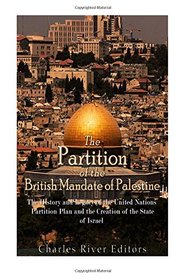The story of creating a Jewish state is a complicated one and I thought Charles Rivers did a fine job of explaining the ins-and-outs of the process. The British were certainly in the hot seat for promising both the Arabs and the Jews assistance in reaching their goals after WWI. It is interesting to note that the name 'Palestine' was used for the first time in modern history by the British. After reading this, it is no wonder that the British were so unpopular with both Arabs and Jews.
I did not understand that the Jewish National Fund (beginning after WWI), which spent funds to buy Arab land, was buying it from absentee Arab feudal landowners, but those sales affected the poor Arabs, who had lived on or had access to the land for generations. No wonder the Arabs (working the land) were so upset. Another problem was in Jerusalem, where the religious significance of many sites for both Muslims and Jews, made the whole area a serious hot spot.
This book was eye-opening in so many ways. I didn't know that West Germany paid some $70 billion to Holocaust survivors and others after WWII. According to the author, the 1948 Arab-Israeli War was waged by Arab nations with territorial ambitions. An Arab victory would not have resulted in the formation of a Palestinian state. The tragedy of all this is the permanent refugee status of the Palestinians who escaped the conflicts. I learned a great deal from this explanation of the Arab-Israeli conflict.
I did not understand that the Jewish National Fund (beginning after WWI), which spent funds to buy Arab land, was buying it from absentee Arab feudal landowners, but those sales affected the poor Arabs, who had lived on or had access to the land for generations. No wonder the Arabs (working the land) were so upset. Another problem was in Jerusalem, where the religious significance of many sites for both Muslims and Jews, made the whole area a serious hot spot.
This book was eye-opening in so many ways. I didn't know that West Germany paid some $70 billion to Holocaust survivors and others after WWII. According to the author, the 1948 Arab-Israeli War was waged by Arab nations with territorial ambitions. An Arab victory would not have resulted in the formation of a Palestinian state. The tragedy of all this is the permanent refugee status of the Palestinians who escaped the conflicts. I learned a great deal from this explanation of the Arab-Israeli conflict.




